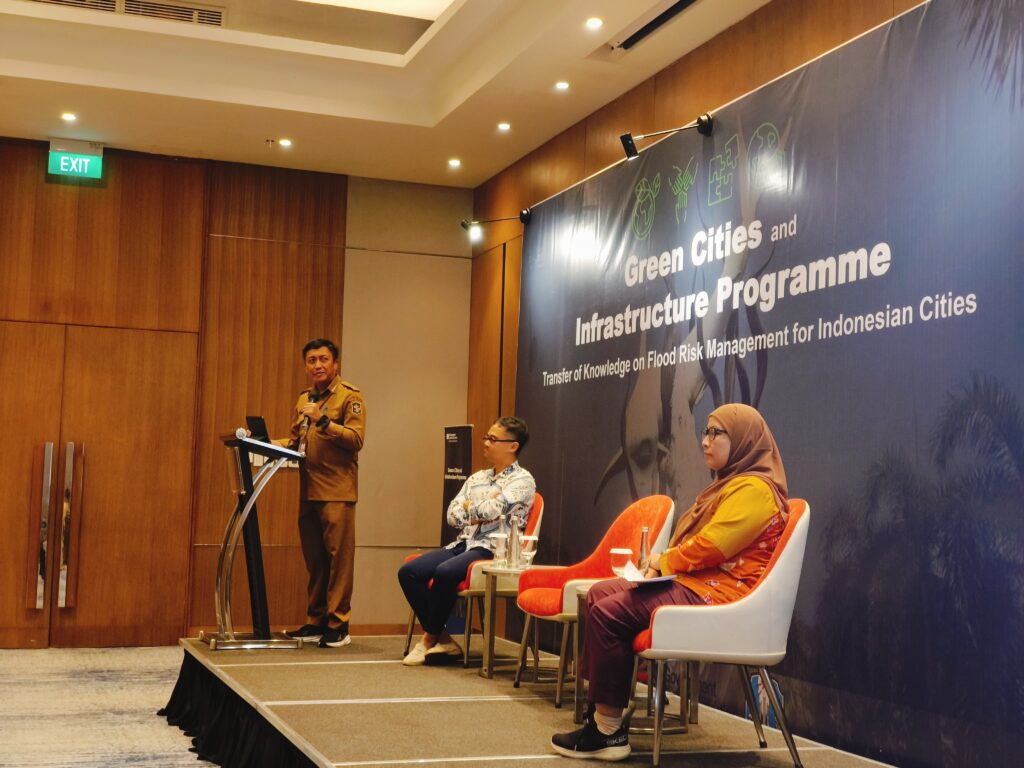- The workshops enhanced local capacity in Surabaya and Denpasar to manage flood risks using inclusive and integrated approaches.
- Participants gained awareness of advanced early warning systems and smart technologies for flood resilience.
- The initiative addressed disparities in data and system maturity between the two cities, drawing on UK expertise and regional case studies.

Dissussions to integrate flood resilience into infrastructure planning in Surabaya and Denpasar.
As part of the Green Cities, Infrastructure and Energy Programme’s (GCIEP) ongoing commitment to strengthening urban resilience in Indonesia, two flood risk management workshops were held in Surabaya and Denpasar on 11 and 13 February 2025, respectively. The sessions brought together 81 participants from 57 organisations, with 95% reporting the workshops as useful or very useful.
These sessions provided a critical platform to integrate flood resilience into infrastructure planning in both cities, which face increasing vulnerability to climate-induced flooding. While Surabaya and Denpasar differ in the availability of data and the maturity of their flood early warning systems (FEWS), addressing these disparities is essential for advancing climate-resilient development.
Drawing on UK expertise and insights from the Bangkok Flood Management Pilot, the workshops achieved two core objectives:
- Strengthened local capacity to predict, prepare for, and respond to flood events through integrated and inclusive approaches. This included incorporating the perspectives of vulnerable groups, represented by civil society organisations, to inform more effective early warning and mitigation strategies.
- Raised awareness among stakeholders on advanced FEWS and smart infrastructure technologies, such as machine learning, that are available for adoption by city authorities.
These workshops build on earlier sessions delivered in Jakarta, Bandung, Semarang, Surakarta and Makassar, forming part of a broader project to address flooding—a pressing issue as climate change drives more frequent and severe weather events.
The workshops aimed specifically to enhance the infrastructure resilience of Surabaya and Denpasar, promoting inclusive and adaptive systems that protect vulnerable communities, local economies and public services. Positive feedback and high levels of participation reflect strong local engagement and alignment with municipal priorities.
Looking ahead, GCIEP will continue working closely with Surabaya stakeholders—notably Bappedalitbang and DSDABM—who have expressed strong interest in developing a city-level flood management system. In Denpasar, GCIEP will deepen collaboration with Dinas SDA in support of the city’s Climate Adaptation Plan. Both cities are also under consideration for forthcoming feasibility studies on urban flood resilience and land value capture.
Through improved coordination, stakeholder understanding and planning capacity, this initiative contributes to more inclusive decision-making, reduced economic disruption and safer, more resilient urban infrastructure.
The UK’s Green Cities, Infrastructure and Energy Programme is tackling climate change and extreme poverty by accelerating the delivery of sustainable green cities and climate-resilient infrastructure
Published
22/05/25
